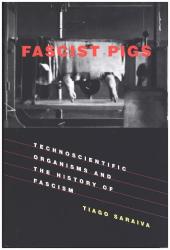 Neuerscheinungen 2016Stand: 2020-02-01 |
Schnellsuche
ISBN/Stichwort/Autor
|
Herderstraße 10
10625 Berlin
Tel.: 030 315 714 16
Fax 030 315 714 14
info@buchspektrum.de |

Tiago Saraiva
Fascist Pigs - Technoscientific Organisms and the History of Fascism
2016. 344 S. w. 64 figs. 236 mm
Verlag/Jahr: MIT PRESS 2016
ISBN: 0-262-03503-0 (0262035030)
Neue ISBN: 978-0-262-03503-3 (9780262035033)
Preis und Lieferzeit: Bitte klicken
In the fascist regimes of Mussolini´s Italy, Salazar´s Portugal, and Hitler´s Germany, the first mass mobilizations involved wheat engineered to take advantage of chemical fertilizers, potatoes resistant to late blight, and pigs that thrived on national produce. Food independence was an early goal of fascism; indeed, as Tiago Saraiva writes in Fascist Pigs, fascists were obsessed with projects to feed the national body from the national soil. Saraiva shows how such technoscientific organisms as specially bred wheat and pigs became important elements in the institutionalization and expansion of fascist regimes. The pigs, the potatoes, and the wheat embodied fascism. In Nazi Germany, only plants and animals conforming to the new national standards would be allowed to reproduce. Pigs that didn´t efficiently convert German-grown potatoes into pork and lard were eliminated. Saraiva´s highly original account-the first systematic study of the relation between science and fascism-argues that the "back to the land" aspect of fascism should be understood as a modernist experiment involving geneticists and their organisms, mass propaganda, overgrown bureaucracy, and violent colonialism.
Tiago Saraiva is Assistant Professor in the Department of History at Drexel University and Associated Researcher at the Institute of Social Sciences of the University of Lisbon.


